#this is essential for having those mistakes mean anything. and in a story ABOUT making mistakes and fixing them. it's so important.
Explore tagged Tumblr posts
Text
PapyrusPikmin1997 replied on Chapter 5: Now, this is an amazing fic, but like… how the hell is Olimar and the President dying in like sublevels 1-3 of the dream den? They aren't even that hard, and canonically the Pikmin leaders cannot die by pure damage, as in Pikmin 2 if both leaders "die" the ship just beams them up back to the surface and the day ends. (Unless however, you don't do it like this and instead make their life support damaged or something, which would be a very intelligent workaround)
Anonymous asked a question on my main blog: I know this sounds random, but for DLD, what... "game mechanics" have been changed? Because, so far it seems like the ""game"" is much harder and ruthless. I can infer that no longer does losing both captains just result in the hocotate ship beaming them up, ending the day and causing all the pikmin to die, but what else?
I received this comment reply and anonymous ask a few days ago, and considering that they're talking about very similar things, I figured I'd respond to them both at the same time. The long and short of it is that both of these questions are making a series of aggressive assumptions about how DLD "works" and kinda getting sidetracked as a result. There are also a few misconceptions that I feel are important to correct, because even if you are thinking of things in vague game mechanics terms (and you shouldn't be), they make it much easier to swallow what's going on if you properly account for them.
Fundamentally, DLD is a grounded story with a strong emphasis on how things would play out in a more or less real-world scenario while factoring known series lore; this groundedness is meant to make the emotional conflicts at the core of the story stand out all the better. For more details, let's continue below the cut, starting with correcting the assumptions.
Number one: The President hasn't been accompanying Olimar on any of his trips to attempt to find Louie. He may be physically present on PNF-404, yes, but he's more or less functioning as a middle-manager type or rubber-stamp than doing anything actually useful. This is demonstrated during the first scene of XVI and compounded via the President's noted absence during every other scene in the chapter. The long and short of it is that he's not relevant to the story that needed to be told here, as this story is very much about Olimar, the Pikmin, and their relationship; having the President be present as anything more than a nod to canon would have made things unnecessarily complicated here in a section that already had too much to say.
Next up: Olimar being alone in the Dream Den (aside from the ship's pod and the Pikmin he brought with him) also solves that "difficulty" issue more or less. I also never said that they specifically died on the first three sublevels — the Dream Den obviously has fourteen, and the only important part of the whereabouts everyone died is that the maximum sublevel they could have reached would be sublevel 13. It's important for the mainline sequels that neither Olimar nor the Pikmin encounter the Titan Dweevil here, so they must have all died before getting to that point; other than that, the exact details of their demise are up to the reader's interpretation, with the most likely scenario being a gradual decline in Pikmin numbers until Olimar fucks up in an encounter with any enemy, gets squashed by any kind of boulder or caught in a bomb rock explosion, or takes too great a blow to anywhere near his head such that his already-compromised helmet shatters and leaves him to slowly succumb to the caustic oxygen in the air.
Another thing is that considering what's "canonical" from the game's perspective is kinda the wrong question to ask in a lot of ways. HP bars or stamina wheels or any other kinds of video game abstractions like that work perfectly fine when you're playing a video game, but the second you're not they become really weird to work with and place very awkward limits on things. From a narrative perspective, working with this video game logic — where Olimar can get thrown around willy-nilly for 12-16 hours taking hard falls or getting crushed by boulders or god knows what else, end the day, and come back the next morning like nothing happened — makes things very awkward, because there aren't any consequences for fucking up. None of the Pikmin games have any kinds of systems to account for major injuries, such as Olimar's dislocated shoulder or Louie's implied concussion both from chapter 4; much less do they have any kinds of energy or stamina system to account for Olimar gradually starving in Chapter 1. Some games have systems like these — take the Fallout series as only one of many examples — but limiting what you can write to what is Explicitly Possible in a game just isn't conducive to writing a good story.
Having the day end when both leaders go down but letting the player try again tomorrow with no consequences other than losing a day is a good choice for a game, because it gives the player a chance to correct their mistakes; however, it's a bad choice for a story, because it removes all of the stakes. On the contrary, part of the reason that Pikmin doesn't have a lot of these systems for longer-term consequences and instead handwaves why some of these things aren't happening — such as PNF-404's relative lower gravity being the reason why none of the characters take fall damage — are because adding those systems would be bad for gameplay. In a game that is very fundamentally about doing things quickly and efficiently, it wouldn't just be annoying if e.g. Louie broke his leg and couldn't move and throw Pikmin at the same time due to needing crutches for a realistic length of healing time, it would be bad game design because it would be far too punishing to be fun. In writing, where the goal is to be fun by having higher stakes, the opposite would be the case.
That's a bit of an oversimplification — not every story benefits from higher stakes, even if DLD itself does — but one could easily write an academic paper about storytelling in interactive vs non-interactive mediums and how they function differently, and I don't have ten billion years to come up with definitions for all of these things to explain everything wrong with applying the rules of a certain medium universally especially when those rules are intended as abstractions. Either way, it comes down to the same thesis statement: "Applying the rules of a very dynamic and choice-based medium to an entirely predefined and non-interactive medium generally does not work well unless you're having your story be about applying those rules and all of the myriad problems or conveniences that it results in." DLD is not about applying Pikmin's video game logic to a non-interactive medium because it has far more important and deliberate things to be about, like communication, trust, personhood, fate, and perhaps most of all, dogs. Therefore, it does not benefit from having simplified video game logic that allows for infinite tries, and would in fact be made infinitely worse if everything that happened so far had no consequences beyond the end results of the immediate day. Olimar needs to die in the Dream Den because this is essential for his character arc; having him just "go down" and "get rescued" to "try again tomorrow" removes all stakes from this, because if he throws himself at the problem enough he'd eventually luck out and be able to save Louie. (Olimar is already very fond of throwing himself at problems until they get fixed; as we'll see, he doesn't need a "get out of jail free" card or a "get out of a bad situation without dying" card to continue with this behavior.)
So if we're not working off of video game logic, how does DLD generally work? More or less real life logic strongly informed by canon material. To some extent it's a vibes thing — I have definitely picked and chosen what works or doesn't depending on my own personal preference, and I've taken liberties with things that happen in the games as necessary to tell the story that I have in mind. For instance, as I've alluded to before, a lot of the rules about Onions and Pikmin work much more similarly to how they do in Pikmin 4 (with the exception of the three-type limit because it's purely a gameplay limitation put in place to not frustrate noobs). Some things, such as the exact symptoms of Olimar's leaflingism, are a blend of various ideas taking inspiration from canon, from other artists, as well as just what works better thematically. (Olimar growing a tail and "fur" certainly emphasizes the fact that he's a dog, not to mention the fact that it's that perfect combination of "cool" and "utterly horrifying", and the fact that his face remains uncovered by leaves has another thematic reading that we'll get to much, much later.)
But a lot of the minor day-to-day stuff is grounded pretty solidly in reality and an understanding of "if you were an inch tall, how would you approach this situation", which is much more effective for conveying the level of Absolute Deep Shit and general danger PNF-404 presents almost the entire time. You would not survive if a boulder three times as wide as you were tall rolled over you; Olimar and the other captains only do because Pikmin doesn't have permadeath, since that would be a very frustrating gameplay experience. You can cheat your way out of things like that hurting as much as they would for you, a Normal Human, especially when you factor in the fact that they are an inch tall, but past a point there's only so much handwaving you can do before you have to accept that half of the things that you only take "major damage" for in Pikmin would just be nearly instakills in real life. Allowing for more realistic damage creates more story, not less; you can't take damage from cornering too tightly in any of the games, but allowing it to jar Olimar's shoulder like that in Chapter 4 gives reasonable stakes that add to the situation rather than detract, as it makes it feel even more like the water wraith is a real threat.
As for other "game mechanics" that have been changed… thinking of DLD as a "game" in general is the wrong question. My philosophy with DLD so far has been to create a relatively grounded story about people and choices using Pikmin as a scaffold. (Not that DLD or any of its side material could ever be divorced from Pikmin itself — they're far too intertwined — but being faithful to game mechanics is literally the last priority that will only ever be nodded at in things such as the occasional mention of the max 100 squad size.) For everything else, I've tried to flesh the setting out using "speculative realism" where possible: by examining how things actually work in real life and applying those same principles to this setting.
For instance, while a lot of the medical science is simplified for a variety of reasons, such as ease of research and reduced scene complexity, almost all of it so far has actually had at least a little bit of research put into it. (Maybe don't orally ingest a topical eye medication, but tetrahydrozoline hydrochloride is a common active ingredient in eye drops or nasal sprays that reduces mucus membrane irritation; Omnicillin Z3 uses the naming convention of antibiotics in the penicillin family, implying that their medical science has progressed beyond ours; and demethoxycurcumin, one of the "active ingredients" in turmeric, is a yellow-orange compound that has anticancer effects among many other health benefits.) I've put a similar level of pseudorealism into the flight scenes as well; I've mentioned Olimar using various kinds of checklists multiple times (Wikipedia only has a page on preflight checklists, but here's a full list of checklists for a 747), and implied that Olimar has been acting as captain and pilot flying while the Hocotate Ship is effectively first officer and pilot monitoring via both of them effectively employing cockpit resource management principles. I even had Olimar do a walk-around on Day 30, though that was admittedly less of an intentional choice than being simply what the scene required for proper pacing. Even a lot of the specifics around how Olimar has been able to live as a leafling up to (and beyond) this point have had a lot of consideration put into them with vague real-life-adjacent explanations — it is admittedly more vibes-based than some of the rest of what I've listed out here, but most of that is because leaflingism in and of itself is a rather hefty lift away from grounded reality.
The long and short of it is: If something is actually important to be thinking about, the story will tell you that. If it's not, it won't. It should be easy enough to figure out what the actual differences are from there, but a lot of those differences simply aren't relevant on any grand scale.
In fact, the only "game mechanic" I can think of that's even vaguely relevant (and isn't essentially rolled into "baseline lore", such as the mechanics of Pikmin and Onions that I mentioned earlier) is Pikmin 1's ending requirements. DLD has simplified these requirements, in that there's no longer a strict two-tiered system with some specific parts being required while others are optional, but the general outline for part count has already been referenced in Chapter 1's title. In these relaxed requirements, you get the bad ending with 24 parts or fewer; the neutral ending with 25-29 parts; and the true ending with 30 parts. (I.E., the only change is that it's any 25 parts being required to get the neutral ending or greater rather than 25 specific parts.) Chapter 1 splits the difference as the exact dividing line between two wildly divergent outcomes of the bad or neutral endings, and thus the chapter title references 24.5, or the numeric dividing line between those endings.
Other than that, the exact game mechanics of all games in the series are for the most part entirely irrelevant. DLD is a story about people, and critically, one of the most important things that a person can do is die. Robbing Olimar and the Pikmin of their ability to end is a choice that must be made very deliberately, with great intent on the part of the story being told, and shouldn't be done merely out of faithfulness to the source material. …And that's about all I can say to avoid unnecessary spoilers.
#dogs leading dogs#dld posting#ask#i think that mostly sums it up. idk this perspective just seems like a very odd way to approach reading a fic? at least to me#but maybe there are other writers out there who are actively faithful to the weird game mechanics above all else?#or just haven't written anything that goes counter to some of these game mechanics?#idk. just a very interesting perspective here#but yea. i won't say DLD is trying for 100% realism (i can't get a degree in everything ive thought about re: this fic series so far)#but Grounded is a good way to put it. olimar and the pikmin can face realistic consequences for their mistakes.#this is essential for having those mistakes mean anything. and in a story ABOUT making mistakes and fixing them. it's so important.
6 notes
·
View notes
Text
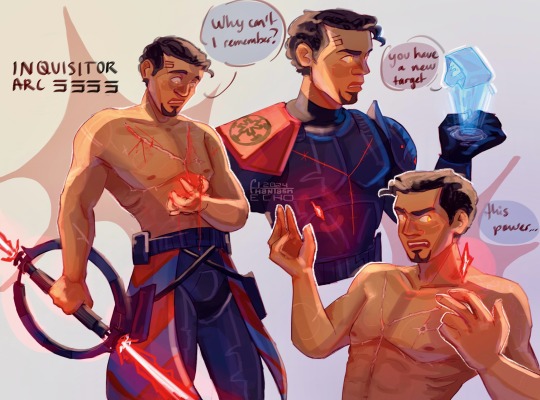
POV: you wake up in the middle of your own autopsy with force powers then immediately get brainwashed into falling to the dark side
I was reminded of the fact that I haven’t drawn inquisitor!fives’ autopsy scars in way too long so here I am, delivering a few too many Fives 💀
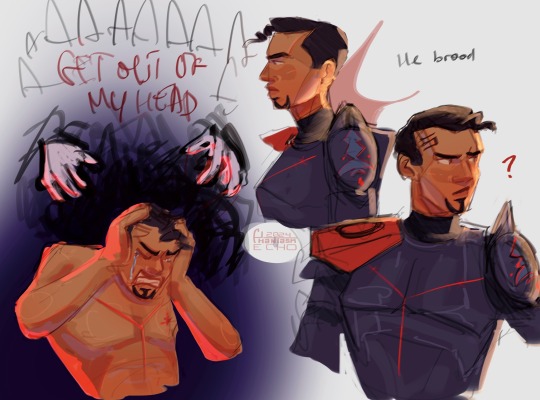
Anyway I know I don’t post much about the AU on here so props to anyone who knows what’s going on here even slightly, I’ve decided to nerf siren!echo (who WAS part of this AU yes I know quite random) but since him being turned into a siren kinda limits what I can do with him story wise he is now an AU of the AU.
That means the name I came up with for the au (dead mean walking/swimming or dmw(s) as I’ve been tagging it) is kinda irrelevant. I’ll just call this the inquisitor fives AU but if you have any AU name suggestions feel free to drop them.
Here are some of the major factors of the AU:
It gets worse before it gets better
(WARNING: there are quite a few heavy topics covered in the AU such as torture, dehumanisation and su*cidal thoughts, so pls read at your own discretion)
- fives wakes up in the middle of his own autopsy with force sensitivity, then gets brainwashed into falling to the Dark Side by Palpatine. As an Inquisitor, he does not remember anything about his life because those memories were blocked by Palpatine.
- Palpatine discovers that Fives is essentially immortal, and any injuries inflicted on him will heal no matter how bad.
- when echo gets rescued from skako minor, he is recalled to Kamino for experimentation, first of all so they can figure out what the Techno Union did to him, second of all to see how he survived his injuries. Nala se, who knows that fives came back to life, theorises that since he and echo were tube twins they share the “immortality”. He is kept on Kamino for VERY extensive experimentation where terrible things happen to him (cough vivisection cough lobotomy) and so never joins Clone Force 99 even if he did work with them on Anaxes.
- Fives in this time is sent out on many missions by Palpatine that involve him unaliving many people, and after the rise of the Empire he hunts a few Jedi.
- Fox, who throughout the war had experienced many blackout missions where he woke up afterwards covered in blood, is the last living Coruscant Guard commander. (Thorn dies, stone vanishes one day, Thire mistakes Vader for a Jedi and pays the price) Despite the best efforts of his son secretary Dogma (no way!?) Fox has very little will to live, is extremely depressed and borderline suicidal, he would like nothing more than to bite the dust, but still feels he has a duty to the very few remaining corries and so tries to keep it together (he is failing)
- one day Palpatine decides he doesn’t need Fox to do his bidding anymore since he has much better assets at his disposal (Fives), and decides it would be ironic to sic his pet clone inquisitor onto Fox. Fives still doesn’t remember anything, and only knows that Fox is responsible for the main scars on his body and believes fox is the reason he doesn’t remember most of his life, and so sets out to kill fox. They battle it out (ref to that one animation wip I posted) and fives is on the verge of killing fox (who didn’t really try to fight that much, like I said he would very much like to die and dying at the hand of the vod he “killed” seems fitting to him) when he gets a sudden vision of echo.
- all fives knows is echo is extremely important to him and must be rescued and that snaps him out of palpatine’s control. He knows he probably can’t rescue echo alone, and since fox has already been betrayed by the empire he decides “fuck it” and basically kidnaps fox and they run. They make a deal, that once echo has been found, Fives will put Fox out of his misery (fox feels that fives should be the only person to kill him, and only goes along with the plan because he refuses to let anyone else kill him)
- fox and fives proceed to go on an intergalactic road trip to “rescue echo” even though neither of them know how to do that. They become closer friends throughout, and fives slowly regains bits and pieces of the Before
- meanwhile during the destruction of Kamino, the bad batch stumble on echo and rescue him and he stays with them for a little bit before leaving with Rex
- meanwhile Dogma helps the rest of the remaining Corries desert, kills too many storm troopers, and tries to go after his buir fox and the bastard inquisitor who kidnapped him
This is the main stuff you need to know for the AU haha so if you’ve got new name suggestions I’m all ears ty!!
#dmw(s)#back in black AU#dead men walking AU#my art#star wars#star wars the clone wars#the clone wars#star wars art#star wars tcw#sw tcw#tbb echo#arc trooper echo#star wars au#inquisitor fives#inquisitor#force sensitive fives#fox and fives#tcw fives#clone trooper fives#arc trooper fives#fives#star wars alternate universe#clone wars fanart#star wars clone wars#clone wars#clone wars au#commander fox#domino twins
2K notes
·
View notes
Text
Thinking about how KCD1 and 2 are both set in 1403 is always crazy to me. Because at the beginning of KCD 2, you have Henry telling Hans that he's behaving like a spoiled brat (which he is, absolutely).
But when you start KCD1, which, again, happened that same year, you have big baby Henry, who would whine to his Ma about being hungry, who also would run to his Ma when he had a booboo because some drunk beat him up, and who gets pocket money from his Pa to go woo his girl at the tavern.

And it breaks my heart to think about how fast Henry had to grow up after losing everything in Skalitz. He was so unprepared for everything that was thrown at him. The only things he had going for him to face his new reality were a braveness that verges on madness and maybe a certain way with people – Because he was Skalitz’s beloved boy. Beloved by his parents, obviously, but also by most of the villagers who all seemed fond of him. But then, after the raid, he didn't even have the support of those people anymore, because they were either dead or had lost everything.
After Skalitz, the remaining villagers needed him to find them jobs to survive. And the people at Rattay did eventually warm up to him, but it was a slow process. And for that to happen, he had to chase and kill bandits for them, or to steal things for them and join them in their shady business. Such a stark contrast to the favors people would ask from him back in Skalitz, like throwing dung at people's houses for shittalking the king.
But among everyone else who needed him for vital or grim reasons, there was Hans and his silly requests. Hans, who needed him to fetch wine and flowers, and to be his wingman to woo a girl. Hans, who wanted him to take part in a tourney and pretend to be his page to get his uncle off his back. Hans, who despite their rocky start and class divide, was one of the people who warmed up to him the quickest, and who essentially reminded Henry that the days when his actions didn't have to have life or death stakes and could be just mischievous fun weren't gone completely.
"A bad day is just a bad day and it doesn't mean that your whole life is fucked" That piece of wisdom from Hans in KCD2, it’s Hans who makes Henry realize that in KCD1, during the earliest and darkest days of his grief.
Fast forward to KCD2, it's now Hans who has to grow up too fast, when he's first brutally stripped of the privileges of his status, and then is thrown into a losing battle against Sigismund and his allies.
If KCD1 is Henry's coming of age story, KCD2 is Hans's. He goes from making Henry do his share of his work, to wishing he could be the one to save Henry for once(*). He also goes from thinking that hauling sacks is beneath him to volunteering to dig graves. And he learns to accept responsibility for what happened at the pond.
Up until KCD2, Hanush was always nearby to handle serious matters for Hans as his guardian. Delivering that message to Von Bergow is Hans's first time in a leading position.
He thinks he's ready, but almost immediately, he makes a mistake that gets his men killed, and puts him in a situation where people won't recognize his status because he doesn't look the part. That mistake almost gets him hanged, one of the lowliest deaths, even for a peasant. It reminds him of the precariousness of his status, which he has been taking for granted.
Then, when his status is acknowledged again, he realizes it makes him a bargaining chip more than anything. And he is a bargaining chip both to his enemies, who will capture him for a ransom, but also to his allies who, will marry him off without his input to reinforce their political standing.
And through all of this, the one person who stayed loyal to him was Henry. Henry did everything in his power to save him when no one else was on his side because they took him for a mere poacher. Then he found that while his allies mostly care about what they can gain or lose from him, Henry only cares about keeping him safe, and it's not because it's his duty, but because he cares about him, plain and simple.
In KCD1, Henry, who was used to a carefree life, suddenly has to take on responsibilities that are too heavy for him (or anybody, really). But Hans reminds him that his carefree days aren't completely gone.
In KCD2, Hans thinks that inheriting Rattay will open a smooth path to glory for him, but the following events quickly disillusion him about that. But he also finds that there is someone he can always rely on, and it's Henry, and it's not because he's a noble but because of his person.
They were each other's beacon in their darkest times. The way they complete each other, it's really no surprise that they fell in love along the way.
(*) Never mind that he did save Henry multiple times, but I think what he means is that he wishes he could take on some dangerous tasks so that Henry wouldn't be the one who has to risk his life all the time.
#kcd#kingdom come deliverance#kcd2#hans capon#henry of skalitz#spoilers#theresa too was a haven for henry in kcd1#but she was his love interest so what does that say about hans#but sure their romance in kcd2 came out of nowhere
474 notes
·
View notes
Text
can't sleep so im thinking about sb94 again, as one does. sometimes i see fans talk about reworking tana into a completely different and wholly inoffensive character in response to the fact that kesel [somehow, inadvertently?] made the only woc in the main cast a sexual predator to a white boy [because he seemingly didn't think women could prey on boys, i guess? but that's another post entirely] and i have to say... like, as a poc in fandom i understand the urge, but as a stickler for characterization i really don't care for those concepts, personally.
one of tana's core character traits is ambition. even if you cut out the entire romance plot (which, imo, changing this changes a lot about kon's early character arc), one of her most consistent traits is that she is focused on her career. when faced with the moral dilemma of knowing vinnie edge hired the stinger to attack kon for publicity, but also knowing that whistleblowing would cost her her job, she chose to keep silent. while this is an understandable choice in that she was 23 and new at her job and therefore not in a good position to negotiate while being essentially blackmailed about it, the fact that this plot gets dropped after rots makes it read like despite leaving wgbs, she chooses to never come forward about it. add that to the way she consistently uses kon as an easy source of stories she gets first access to, and that she justifies this to herself a lot, and, well, i think that makes for a much more interesting character beat than a more sanitized version of her. i think it's very possible to have a character who is selfish and ambitious and wants to protect herself first and foremost, while also wanting to believe she is a good person, and struggling with her denial and her ability to talk herself into things she thinks she might regret, who does genuinely bad things, without making her into an offensive stereotype, and i find that much more faithful to her existing characterization than rewriting her from the ground up to become someone who does nothing wrong. (i also don't think it's that easy to say tana fits the predatory woc stereotype as all, but that's also another post.)
the issue with her being the singular woc on the cast and also being a predator does exist, though, and my thought process is more like... okay. a woman of color can do anything a white man can do. that includes massively sucking as a person sometimes. i think that, re: tana, there's two things to say on that front:
1) fandom and the internet in general have a tendency to jump on the idea that someone who does something wrong and hurts someone else is a bad person forever and forever marred by it. i do not believe that this view coheres with ideas of restorative justice, which i personally feel strongly about. this includes crimes people find distasteful to think about, such as grooming: i think it is completely possible to have tana be a character who, by convincing herself that kon wants this relationship, and it's good for her career, so really she isn't doing anything wrong, ends up really hurting kon, AND at the same time to have her be a well-rounded individual who is capable of growing up a bit more, realizing she made mistakes and hurt someone she did genuinely care about, and grappling with what that means now. like, her being fridged prevented any story dealing with the ramifications of her and kon's relationship, but to me, the idea of her having to deal with her actions is something far more interesting to think about than if she never did them. whether or not she actually grows as a person and admits fault, or if she doubles down on denial, etc, could all be interesting character choices, and are also very human responses to guilt. a lot of people just have this kneejerk response to dehumanize any character (particularly woc) associated with sexual crimes, grooming, etc, but i think that really is dodging the uncomfortable truth that a) no crime, no matter how heinous, merits the dehumanization of the perpetrator, and also that b) in stories, a character can commit uncomfortable and horrifying acts and still have nuance and depth as a character.
which brings me to point 2): that the solution to offensive stereotypes is not to insist that no one of x demographic can ever do y thing; it's to provide more characters of x demographic, so that the onus of representing an entire group isn't just on one character. tana being an indigenous hawaiian woman who grooms a white boy wouldn't be nearly so offensive if there were other significant indigenous hawaiian women in the narrative, not doing any of that. if hillary got more of a role, for example, or if (and hear me out, because this is my magnum opus of niche-ass superboy 1994 opinions:) silver sword got brought on as a mentor figure to kon and also was a trans woman. frankly, the handling of silver sword's story was egregious and if anything deserves a good, less racist rewrite, imo, it's his whole arc. kon getting an indigenous mentor to actually teach him about hawaii and the issues with colonialism and tourism and their impact on everything could've been really good actually, and silver sword would've been perfect if they didn't write him off like that. ... or, should i say, write her off like that?
listen i just think silver sword could've been an awesome native hawaiian transfem professor and a recurring part of the kon squad in hawaii. do you see the vision
#rimi talks#uuhhhhh what do i tag this. it's a long ass post and so rambly#but like yeah i just think declawing tana is so boring. keep her flaws just add more native hawaiian women#if your tana would've come forward about the stinger that ain't tana. to me.#like i know everyone goes oouhhh nooo grooming bad it shouldn't happen in fiction#but i do actually think the horrific exploitation by those he trusted and loved bc he had no life experience = formative#it's a good backstory even if it's heartbreaking. and softening it up into something more palatable is just so boring to me#also im still fascinated by the way kesel writes her very much using kon for her career but doesn't at all condemn that#like yes she is using him. but don't worry! she's still the good and mature and Most Correct love interest#but again. man. analyzing the narrative treatment of her is another post and this is already really long#anyways. um. tags. right#tana#kon#grooming cw#silver sword
101 notes
·
View notes
Text
In seriousness I think the biggest critique of Ludinus Da'leth beyond "he literally didn't need to do all that" is that, weirdly, for all his grandiosity, he lacked vision. To be clear this is not a critique of him narratively - this is, in fact, the petard on which many, many villains end up hoisted, and it's only a few scenes in the unraveling slog that is C3 post-Solstice Split and pre Final Push that really work against him as a villain (notably the Shattered Teeth fight and whatever the fuck that was in the Feywild, and I think most of that was that Bells Hells wouldn't do anything unless you outright put a gun to their head and even then it was kind of a coin flip). It's that in a thousand years, despite incredible magical developments on his part, he really never moved past the punitive and almost childishly simple "Calamity was awful, so I will kill the gods." Not only did he fail to achieve that in the end, his path to that was repeating the exact mistakes of Calamity - destroying cities, exploiting magical creatures and people, rebuilding empires, and releasing ancient sealed evils. He claims a goal of liberation despite having lived, essentially, nearly two lifetimes of an already long-lived race actively engaging in oppression.
He is also, like many villains - again, not a bad thing for writing/playing villains - a fairly static character. He does not change much from his introduction in Campaign 2 through his ending in Campaign 3; it's just a slow reveal of what's beneath the tip of the iceberg. His scene in episode 2x97 is ultimately the crux of it all: he could have stopped Trent - easily - and he not only didn't but indeed made use of what Trent had built. He pretends to be sorrowful when one of Trent's victims manages to break free and gain a certain degree of clout, and then immediately turns around and uses those still under Trent's thumb to stalk him. That never falters. There is no care for anyone else except as tools; Liliana believes he listens to her, but given her eventual fate when she defies him, all that ever means is that she believed him where Caleb did not.
Which is why his ending in Campaign 3 rings so hollow (and why, if Tag Team at the Teeth is indeed his end, while it's later than it would have be in a better-crafted story* it is at least an immense improvement on leaving things as is): he has not changed. He has shown no evidence of change; he has not even tried to change. He has never shown an ounce of remorse. For all that Liliana shows little remorse for the lives of anyone outside her family that she destroyed, nor for her alliance with oppressive forces on Ruidus solely for her own gain and comfort, at least there is some degree of coercion involved, a (morally dubious, of unclear if any value, and far too late) attempt at resistance that at least signifies a capacity for change, and some tenuous connections to her humanity that, in my more generous moments I can grant as a start to the long process of making amends.
Ludinus simply weasels his way out. There is not even the ghost of an attempt to make amends; nor is there any indication the gods' continued existence in mortal form will placate him should he discover it. He did not want the gods to change; he wanted them dead. He was never interested in a better Exandria by the metrics of the people who actively lived in it, or even in change that wasn't his same old thirst for vengeance, and certainly didn't care about the people of Ruidus. He destroyed Molaesmyr, warmongered with the Kryn Dynasty, and above all upheld the Dwendalian Empire's oppressive structures for his own gain while happily talking out the other side of his mouth to those harmed by them; there was little if anything he would not do as a side-effect of his single-minded and ruthless pursuit. He was willing to die for his own selfish cause; but that means nothing given the thousands if not more innocents he was far more willing to sacrifice, and it's a cop-out itself: he dies and everyone else is left to clean up the mess. He dies and everyone else has to actually build the better world he talked about but had no plans for beyond shallow vengeance. There is no nobility in this death; it's just sneaking out the back door before the consequences arrive. The best case scenario for the world is simply that he hangs out, isolated, drinking tea, unaware that his plans failed utterly, until he meets a peaceful and solitary end. And because we know he can be very patient, and has at least the knowledge of how to extend his life indefinitely at the cost of others', and has recreated the means at least twice, I don't trust that that's a risk worth taking.
*this would be a whole separate post but: while actual play of course has an element of unpredictability, I do think that the most important thing to land, plot-wise, in a story that ends with a climactic BBEG fight, is understanding the motivations of the BBEG and having a satisfying resolution. Loose threads of other varieties (Sylas, Uk'otoa, etc) are fine; further information after the fact providing even more context (Nine Eyes of Lucien) is fine; but if you don't resolve at least a basic "why" and "what happens" to the BBEG by the finale and have to wrap up in a later episode, it's bad storytelling.
#i have another crit post i want to make but i feel like this is a lot so i might save it for saturday#it's not about c3 or even mostly cr though#critical role#long post#it's all vengeance and spectacle and wounded opportunism and exploitation of the pain of others to justify selfish ends#promising a better world with no plan no vision and no intention to actually participate in its creation. get his ass.
103 notes
·
View notes
Text
SCHOOL SPIRITS FINALE THEORIES
okay so i figured i would compile a list of theories i think could plausibly happen in the finale and kinda combine them with my own thoughts bc im losing sleep reading through reddit posts and i need to put this all down somewhere
1) maddie’s body is inhospitable
okay so im not sure how this would work, but i think it’s very likely maddie will not be able to return to her body (at least not for long). the reason i believe this is because if her body WAS inhospitable after returning to it and needed medical attention, it would bring her to the hospital where we know her dad’s spirit is. this would allow maddie to communicate with her father and the ghosts in the hospital, and bring back the xavier plot — it would be interesting if his near death experience allows him to see maddie in the hospital like simon sees her in the school, then he would become the source of communication next season (pls give us s3)
2) simon dies :(
i think most people are in agreement that something awful might happen to my best boy simon this season. asides from the obvious signs that he might not be well (seeing maddie, clutching his head, overwhelmed and stressed), i really do believe he would do anything for maddie, which makes him the obvious self-sacrifice. maybe it’s something pre existing, maybe mr martin injures him while he’s trying to attack maddie or janet, maybe he gets body snatched, or maybe he willingly gives it up because the ghosts and maddie need his help — im unsure, but his name on those essential oils in the mystery box makes me uneasy, and i also think it would add weight to the theory of maddie ending up in the hospitable. he would almost replace her in the school (making their separation even more tragic i miss them sm).
also, if xavier could see maddie due to his near death experience then there’s a chance he could see simon, especially since those two have gotten close, and it would create open communication between the ghosts in the school AND in the hospital
3) they break down the barrier
i think this is really likely, and it would be yet another way that the hospital could come into play. we know the ghosts all enter the scars together, so maybe fighting through them is enough to break the barrier altogether. this would mean maddie could have a plot with her dad if she stays a ghost because she can leave the school. it could also mean that they thin the veil and the living kids could see the ghosts, which i think would be pure chaos and would be a real learning curve for s3 (pls)
4) janet didn’t start the fire
no photo, no proof. since we didn’t see a flashback of janet starting the fire, then to me it’s not true. that’s just what she thinks happened. there are lots of theories on this one — maybe it was janet’s dad in his anger and disdain for mr martin and janet’s love of science, maybe it was mr martin/woman in the scar with an ulterior motive or anger for losing his job or an experiment gone wrong, or maybe it was eugene. i’m not sure of his motive, but there’ll be something in that storage locker and he DID say janet and mr martin wouldn’t have made that mistake. regardless, i really don’t think it was janet
5) ghost/s cross over
while i would be really sad about this, i feel it could happen. but personally if feel it’s more more likely that yuri or quinn could cross over rather than the main ghosts. this is mostly because their stories aren’t as developed, and i don’t think the show is ready to lose the main ghosts yet — audiences love them and they build up a lot of the plot, so i think they might hold onto them for as long as possible (permitted we get a season 3). i think quinn and yuri have tackled enough for them to cross over (no longer isolating themselves, finding connections, no longer looping) and we haven’t seen their scars yet, just like we didnt really see dawn’s. their names also weren’t on the essential oils, so…
if one of the main ghosts cross over, most people are speculating it’ll be rhonda or wally. wally DID have a bright light in front of him in the episode trailer, but im not sure. i feel like crying thinking about any of them crossing over
6) janet is the real ‘big bad’
idk how i feel about this one bc im lowkey a janet ride or die, but it could be really interesting if she’s triple bluffing and everyone’s blindsided. it would be a fun twist and would explain why in the teaser maddie and janet seem to be tussling in the pool (??). maybe this was all a bigger plan? maybe she refuses to give the body back? im unsure. this seems more likely to be maddie’s scar to me, like she and janet were grappling for control of her body when it was first snatched??
i have sooo many more i’ve seen, everyone is sooo creative, but what do you guys think? i wanna know what you think will happen
#school spirits#school spirits season 2#school spirits spoilers#charley school spirits#claire zomer#maddie nears#mr anderson#mr martin#rhonda school spirits#wally clark#nicole school spirits#xavier baxter#yuri school spirits#quinn school spirits#simon elroy
23 notes
·
View notes
Text
I feel like I should write out some proper thoughts about my opinions on Veilguard, or at least an outline for the much longer essay that is currently calcifying in my heart. It's a mixed bag of a reaction, and I'm not going to compliment sandwiching any of it--this is all just stream of consciousness, so I'm probably going to snag on the negative and spiral down that pretty quickly. Spoilers, obviously:
I liked the battle system. For the first time in a DA game, it actually felt satisfying to play and had its own identity. I do wish the Pokemon element aspect was a little better balanced among the companions, but overall it was great.
That said, considering the length of the game, they needed way more enemy diversity, especially with the bosses. Eventually I was just fighting dragons, and every dragon had essentially the same moveset, one of those moves being "the dragon trips over her own dick and face-plants on top of Rook", which sure doesn't make the fights feel epic. Even very unique characters, like the Gloom Howler, were just reskinned basic demons when it came time to fight them.
The decision to tie companion approval to companion levels was a mistake. A massive and extremely obvious mistake. No wonder there are no disagreements or tension among the group--the game can't let you lose affinity with your team members, because then it would have to account for you leveling them down. The gameplay design here strangled the narrative design in its crib.
Speaking of narrative design: while I appreciate that the modular approach to companion arcs was experimental, it was extremely weird of them to take that approach in the only DA game where all companions are required. The story doesn't have to be written to account for the fact that you might not recruit some of them or they might die early--so why didn't they write one story about Rook and their seven friends instead of one story about Rook and also there are seven smaller, unrelated stories of extremely varying quality shoved in next to it?
The hyperfixation on the companion quests paired with their complete compartmentalization from each other means that each companion basically has nothing going on outside of their own quest and very few opportunities to engage with other characters' quests.
I was so starved for conflict in this game that I went from Solas-neutral to Solas-positive because he was the only character who the game allowed to be a bitch to me, and I respect him for that.
I do like all the horrid little sons the game gives me. I think I would appreciate them more if there was anything bad or tense happening in the story on a personal level that required some comic relief, but I am a sucker for a funky little guy none the less, and Manfred, Assan, and Spite are the perfect trifecta of funky little guys, as far as I'm concerned.
"We're only going to do character cameos if it's important to the plot." *does what they did with Isabela* Okay, devs.
"We aren't importing player choices but we won't override your decisions either." *several codex entries overriding player decisions later* Okay, devs.
I like the companions, generally. I see their potential. Fanfic will do right by them. Harding, in my mind, is the weakest of the bunch, just truly having no personality to speak of and talking like she was written by a Boomer who thinks that Millennials are still teenagers. (Everyone responsible for her uttering the phrase "Awkward..." like she's a character in 2011 quirky girl sitcom should be tried at the fucking Hague, istg.) And while I like Bellara, it was extremely frustrating to have a character that's just "Merrill, again, but with the edges sanded off". Taash and Emmerich are also glaringly the last additions in the writing process, each belonging to one of the two most underbaked factions and neither of them being tied to any of the game's few "big choices". There's promise in this cast, but I don't think any of them came close to realizing their potential.
Davrin and Emmerich's companion quests felt appropriately scoped to the size of the questlines, had good emotionality, good antagonists, and expanded on the lore of Thedas in ways we hadn't seen yet.
Lucanis's companion quest had potential, but it was too unfocused with three antagonists, too much attention to the boring Venatori shit, and not enough examination on Illario's motives or Lucanis's relationships with either Spite or Illario.
Harding's companion quest was fine, I guess (the people are starving for dwarf lore), but Harding could have been swapped out with literally any other dwarven character who wasn't Sandal and nothing would have been different. (Also weird that the whole quest was basically about Sandal while simultaneously fully removing Sandal from the narrative.)
Bellara and Neve's companion quests were just nothing. Just a whole lot of nothing. And Neve's also suffered from what I like to call "machete editing", where it is glaring obviously where things were cut, changed, moved around, and added at the last minute.
I say, from the bottom of my non-binary heart: Taash's companion quest is total ass. Real nice of Mae to come out of hiding and risk being found and executed by the Venatori to give Taash a Queer Theory 101 class, though, I fucking guess.
Is Lucanis's romance bugged? Apparently I'm not the only one who had that thought while I was playing it, so now I'm wondering. Like, there's no way they made it Like That on purpose, right?
Why and how are the Venatori still a force in Thedas, never mind a force with numbers so great (in spite of lacking a central leader) that they were able to simultaneously occupy the two largest cities in Thedas?
They literally didn't even try with the Antaam. The Venatori are at least theoretically still working to try to restore Tevinter to its former imperial might. The Antaam are just invading countries for literally no reason except ill-defined power grabs. Given the racial coding of Qunari, this writing choice sure is...something. (And that something is racist.)
That said, the revelation that the Butcher did a military tour in Europe and fell in love with the culture and just wants to drink wine and visit art museums now is fucking hilarious.
What the absolute FUCK did they do the Crows. I like the Crow characters from Tevinter Nights/the comics, and Zevran is my favorite character in the whole damn franchise, but they completely whitewashed both TN's mafia take on them and their original portrayal in DA:O. But it also doesn't really retcon anything, making it instead seem like the human trafficking and torture and sexual abuse that Zevran suffered at the Crows' hands A) only happened to him individually, and B) are fine, actually??? Even the very few times that characters express reservations about working with Lucanis because he's an assassin, if you play as a Crow, those concerns get immediately backpedaled, so the Crows end up being so ironed out that the game doesn't even let characters say of the Crows, "Murder is bad," lest it hurt a Crow Rook's feelings. That is how conflict-averse the writing is.
So I guess everyone in southern Thedas is...dead now? Several characters survived long enough to get a mention from the Inquisitor, but by the end, it sounds like Orlais, Ferelden, and most of the Free Marches are pretty much donezo. When Epler said the events in southern Thedas didn't matter, I didn't expect that to mean they were going to nuke the damn place. Even having generally enjoyed VG (in spite of all my criticisms here) that, uh...doesn't leave me enthused about the future of the franchise, ngl.
The layoffs of several writers (and other Bioware employees) before the game's release was obviously heinous. But after that secret ending, I'm now of the mind that of the writers that remain, at least a few of them need to be demoted. Like literally what the fuck was that. That was the dumbest plot point to ever appear in a Dragon Age game, and that is a high bar to clear. If you're not going to acknowledge our past choices, then keep Loghain's name out of your fucking mouths.
#dragon age the veilguard#veilguard critical#datv spoilers#veilguard spoilers#i'm sure i'll add more thoughts as i think them
29 notes
·
View notes
Text
Episode 28 "The city on the edge of forever"
What can I possibly say. This is one of those episodes... I mean, I've been warned. I've heard the stories... But this series has a way to surprise me ... In unexpected ways? Is that even possible?
I love how some parts of the episode are incredibly stupid without taking anything away from its tragedy. For example McCoy injecting himself by mistake is hilarious, I'm sorry, he's so professional all the time and then he makes this one catastrophic mistake. Not to mention the whole thing about Spock having a hard time blending in (the infamous beanie).
But then the concept is so sad and tragic, this woman who needs to die because times aren't ready for her. And the whole thing about "the dangers of pacifism". Honestly the idea itself is debatable, even - or especially - in the context of the late '60. I think I talked about it before, how fascinating to me, the way this theme of "accepting, even justifying, but not condoning violence" is so specific and nuanced, and it's often used in the series; they really try and at times succeed in making a good argument for it ... Although something inside says it can't be true, the "necessity of violence" I'm finding it stimulating to consider and place in context.
Ok let's lighten things up, let's talk Spirk. I'm not going to state the obvious, we all know the good quotes and moments. I will say Kirk sure touches Spock a lot in this one, and I'm always thinking they should just hold hands sometimes, just for comfort, they stand so close to each other anyways! Might as well! Just you know Platonically even!
And btw, I'll let you know, I'm an expert when it comes to Bi Panic and let me tell you James T Kirk is also an expert after this episode. Also verbatim from my notes on the episode: "he's always covered in dirt (Kirk)"
I appreciated how they were all there at the gate on the edge of forever, especially my girl Uhura. This small team of essential personnel embodies the heart of the Enterprise, what Kirk's fights for and what he considered leaving behind. it's nice that he finds them waiting, as a reward for the loss he had to endure for the sake of the future.
One more shout out to McCoy's sick makeup and interpretation, I thought it was very good. But try and not stab yourself with a needle next time.
All in all an iconic episode, I did not expect it to be so sad, but as with other episodes it was so dense with meaning and I love that because it makes your brain and your heart work for it.
#st tos#star trek#star trek tos#the city on the edge of forever#st tos 1#star trek the original series
26 notes
·
View notes
Text


After very long and careful consideration, I’ve decided to not only let y’all know about very important changes I’m gonna be making to my blog, but to also come clean abt something I’ve kept to myself for a long time.
As of today, I have officially decided to make my blog 18+.
I will explain what this will mean for all people under the age of 18 who follow me, what will change about the content I post, and, especially, why I’ve decided to make this change.
I. What will this mean for me, a follower under 18?
All followers who are under the age of 18 will be swiftly removed from my list of followers/following. To those of you that are my friends, don’t worry; that doesn’t mean I won’t still be friends with you! Any convos we have on Discord n such will be 100% SFW, I just can’t have you following my Tumblr page, since I now plan to make it adults only. Any underage followers I’ve removed that attempt to follow me again, along with new minors that follow me after this announcement, will be blocked. No exceptions.
II. What will change about your blog and the artwork/posts you make?
Virtually nothing. I don’t plan to post explicit NSFW or anything like that, [since… as far as I know, that shit ain’t allowed on here], but some artworks I want to share could contain themes meant for more mature audiences, [i.e., Violence, Drugs, Profanity, Sex, and something else I’ll get into in just a second]. I don’t want children who follow me to be influenced by my artwork n’ posts, and repeat behaviors they shouldn’t in the real world. While I never really had a problem with swearing n’ all that on my blog, since that’s something I’ve always done online since I was a kid, there’s a specific subject I’ve wanted to explore, but couldn’t, out of fear of talking about it due to the nature of it, and the danger of influencing impressionable kids.
III. Why are you doing all this? [TW// for sexual and potentially upsetting topics. This section’s for the adults].
Now, this is the part that’s gonna be very difficult to bring up.
Long story short, I’ve come to the realization that I am proship/profic. If you’re unaware what that means, Urban Dictionary defines being profic as:
“An alternative word for the term proship, being shorthand for "pro-fiction", with an emphasis on fiction. The term originally referred to "professionally published fanfiction", however in recent times it has transformed and instead become synonymous with proshippers.
Proponents of pro-fiction argue that art exists in a different capacity than any objective reality, and therefore someone can enjoy taboo subjects in fiction while still being against their harmful real-world counterparts or equivalencies. Their message is to be anti-harassment for controversial fictional subjects in literature and art.
You can be profic without actually consuming problematic content yourself.”
Essentially, what this means is that I am okay with ANYTHING being explored in fiction, regardless of these subjects being problematic in reality. Proshipping is basically the same thing, but specific to being okay with shippings of any characters regardless of whether or not their relationship would be problematic in the real world, because the characters in question are fictional.
I’ve become a lot more open about being profic/proship to my friends, and as a result, I’ve come to want to share these things here on Tumblr, since it seems to be a much more forgiving environment than most places. I want to be able to safely, and responsibly, express these thoughts to an adult audience. I don’t want any children to make the same mistake I made by being exposed to proshipping as young as I was, and potentially be influenced into replicating problematic behaviors irl, NOR do I want to trigger anyone who isn’t okay with fiction that explores taboo/darker themes.
Any posts I make that involve a problematic ship or discuss taboo themes will be appropriately tagged for any adult followers who don’t want to see certain things. But as adults, please be aware that you should be responsible for keeping yourself safe and avoiding content that makes you uncomfortable. Whether you agree with me being proship or not, it is 100% your choice to block me or block any tags I post with so that you can have a pleasant experience scrolling.
I am not responsible for making any users [especially minors, if you’re still reading this] who choose to ignore my warnings uncomfortable with what I post. If something I post that has an obvious “DEAD DOVE: DO NOT EAT” tag on it, don’t be shocked you’ll see a dead dove in it cause OH BOY, it’ll be smelly.
#announcement#i’ll give all adults who wish to leave the rest of today to unfollow before i unleash the demons#ALL MINOR FOLLOWERS UNFOLLOW N O W.#or just face my wrath cause imma clean up my follower list anw
8 notes
·
View notes
Note
One question, no hate. Why do you say we don't know anything about Elia, Lyanna and Rghaegar? Could you elaborate on that?
When I say we don’t really know Elia, Rhaegar, or Lyanna, I mean that we literally don’t know much about them. Everything we know about Rhaegar is filtered through Daenerys’s limited memories of her brother; for Elia, we only have Oberyn’s perspective; and for Lyanna, we rely on Ned and Robert’s memories. But these are just third-party accounts: what Ned says about his sister—that she was kind and beautiful—might change if we heard it from someone from Dorne. The same applies to Elia and Rhaegar, whose image varies depending on who’s telling the story.
This narrative choice has a purpose. These characters serve a specific function in the story: their role is to set events in motion. They’re not essential to the story itself but instead act as catalysts. If George R.R. Martin had wanted Robert’s Rebellion to begin for a different reason, he could have used other characters or motivations. But he chose these stories to connect different houses and conflicts: the story of Lyanna and Rhaegar establishes a link between the Targaryens and the Starks, with the Targaryens resenting the Starks for helping dethrone them and the Starks resenting the Targaryens for abducting Lyanna. These characters are just a starting point; we don’t need to know more about them because their story only matters in this context.
I don’t deny that if they had more developed, well-written backstories, they could be fascinating characters. But, as it stands, they’re not fully explored. We only know that Rhaegar was the crown prince, handsome, skilled at singing and playing the harp (was it the harp? It doesn’t matter), that he was married to Elia and had two children. From Elia, we know she was from Dorne, married to Rhaegar, had two children, was frail, and met a tragic end. And with Lyanna, it’s the same story. In truth, we don’t know who they really were.
Perhaps what the northerners and Ned say about Lyanna—that she was kind, brave, wild, and beautiful—isn’t true. Maybe Lyanna was spoiled, difficult, or immature, but we’ll never know because we only get to see an idealised version of her, or sometimes a demonised one, depending on who’s speaking. The same goes for Elia and Rhaegar. Maybe Elia wasn’t as weak and frail as she’s said to be, but strong and dark-hearted. Maybe Rhaegar was a useless fool or a manipulative mastermind, or perhaps he was just a well-meaning man who made mistakes. We don’t know, because they aren’t three-dimensional characters; they’re “2D” characters who serve a single purpose: to set the story in motion.
This kind of character is common in fiction—those who give a reason for events and then fade into the background. In my previous post on Robert Baratheon, I mentioned Lily and James Potter from the Harry Potter series. We never truly get to know them. We know that Harry looks like his father but has his mother’s eyes; we know that Lily was talented and clever and that James played Quidditch and was a jokester. But beyond that, we only know what other characters say about them. Sirius gives us an idealised view of James, describing him as the best person he could have known, while Snape demonises him, calling him a coward and cruel. Lily and James are just like Lyanna, Rhaegar, and Elia: a starting point for situations that shape the protagonists’ journeys.
Everything depends on who’s telling the story—whether it’s Ned, Dany, Oberyn, or someone else—because each one reveals their version of who these characters were. But is that really the truth? We don’t know. And I think that’s what makes them even more interesting.
19 notes
·
View notes
Note
Yeah, sixteen points is nothing— that’s two race wins which he’d need anyway over the course of a winning season, it’s more how discouraging this weekend proved to be cause he really could have had one this weekend, and I do think he got really unlucky on Sunday and by extension Oscar got lucky in the race :(
Just hard to see with the way the past few weekends and the narrative and McLaren are going.
I totally get it and I share your disappointment!! You probably didn't notice, but I didn't make gifs of anything post-race for almost 12 hours, as I didn't feel at all happy during the podium either. It was a very frustrating race in many ways, and made me dread the next few weeks, but once I'd processed all those negative emotions, there were many positive takeaways too, and that's what I'm choosing to focus on.
You just can't let The Narrative take up too much space in your brain. It's really just noise from the media, a kind of froth on top of the sport, people saying things to say things, punching on the week's punching bags, putting people up on pedestals with outrageous flattery and then tearing them down later. It's an entire industry of outrage storytelling that tries to add layers of meaning, but stories aren't real things that exist in reality.
It's also got the collective long-term memory of a goldfish, but we can do better than that as fans. We remember last year, and we can have a wider perspective on this year. I know how much it sucks to feel excluded from the fun, when it's your driver that so many people are already dancing on the grave of, when he's not even dead, but that's something essential to come to peace with, or the sport will become a drag on your happiness.
For me, the thing is that, I love Lando, but I do also love motorsport as a whole. I love racing, and racing isn't fair. Luck is a huge part of it, and sometimes the wheel of fortune turns down and you get fucked. Races are immensely complicated things, there's multiple WDC drivers on track who also want to win, there's variable track conditions, there's the strategy complications of threatening weather. You can do your best, make few or even no mistakes, and still not win, and that's just part of the maddening appeal of it all to me.
I think Lando's had a fairly rocky start to the year, and done so in a very public way, but he's done it without blaming the team, and they're both aware of and appreciate his loyalty. He had a slump in the triple header, but he stopped that descent and pivoted, and is now on an upward trajectory, and will continue to improve on track even as the media speculates loudly about him, as that's not something that weighs him down. He's focused on racing, so we should focus on racing too.
Of course I don't like that McLaren isn't openly cherishing Lando, isn't fighting back in the way I'd like to see against people who say the cruelest and most inaccurate things about him, but I don't think there's intent to sabotage or a conspiracy to ruin his career either. I think that their media strategy of not responding to things unless absolutely necessary to not add to the narrative doesn't work, but I don't believe that it's malicious either.
I just think we need to accept this has been rough, and that Lando's team is doing everything they can to turn things around, and Lando himself is doing the work to improve. We can do him the favor of listening to him when he talks, and thinking what he wants us to think, and feel what he wants us to feel. I'm not behind closed doors, and I don't like connecting dots when I just don't know enough. Things are okay, Lando's okay, and the season is going to get better.
#lando norris#i know things have been tough#i have also been sad#but i see so much potential#in the rest of the year#it will be ok
19 notes
·
View notes
Note
at work we're having an internal quality review (standard, done every few years) but because my team was literally just me plus the partner plus a rotating cast of managers for the last 3 years it's essentially just a review of my work. they pick 5 cases and in other teams that means you'd be unlucky to have two cases of yours being reviewed, but all 5 are mine. it's not a personal attack but by case 4 it feels like it is, and it's in a grey space of law and accounting so there's huge wiggle room for every decision we made. I'm coping by obsessively rereading In Absentia and all the tumblr snippets. like, I feel bad but at least I'm an accountant and not Mark Webber's neglected sex slave. it's so good, thank you times a million.
omg, you’re not Mark Webbah’s neglected sex slave but they’re reviewing ALL your cases??? In many ways, an even more tragic fate. I understand accounting well enough to know what you mean about the grey area of law + accounting. Like as a lay person, it seems like the numbers should just be the numbers, but I realize now how it’s the same thing of trying to interpret regulations (etc.) and there are often so many grey areas and it’s not actually just about making the math math, but also applying subjective policy/whatever. I feel like this probably won’t help, but it seeeems like that must mean you’re doing awesome to be assigned such complex cases and the fact that they’re talking so much about the wiggle room means for sure it’s not like straightforward “the team made a mistake” but like “this is incredibly complex and the whole lot of us are still trying to untangle the intricacies”?
If I can offer some further distraction as you suffer so terribly, let’s skip forward from the really sad stuff, which would have come next chronologically, to when Oscar’s sent to Daniel&Lando’s for a visit. Skip this if you don’t want to jump ahead in the story - I was just trying to think of something reasonably nice I could post for you that wasn’t too much of a spoiler.
800 words of In Abidance, Oscar + Dando.
Daniel had moved to a new estate. The carriage pulled Oscar down a long wooded drive, suggesting at the scale of the property, but though the estate was clearly larger as well, it seemed generally more run down. The stairs leading up to the front entry needed to be refinished. The door knocker and handle had gone green with patina.
Behind him, Oscar could hear the carriage pulling away. He wiped his palms on his trousers, wishing he had something to occupy his hands, an excuse to dawdle, but he hadn’t thought to pack anything until he was already in the carriage. It would have been an ordeal, anyway, because he didn’t have luggage and doubted anyone would have been glad to see him dragging out the heavy old chest where he kept his things at Mark’s house.
But he felt stupid, now, standing here empty handed, unsure of the current time or when they’d agreed for him to come or how the discussion had gone. Or, in fact, if it had been agreed upon at all. Oscar imagined trying to explain to an unaware Daniel that Mark had sent him over. He needed to knock, but if he knocked and no one came, he’d have to decide how long he was going to keep banging for, and it seemed that there was an etiquette to these things that Oscar didn’t understand.
And then, as though this one time he’d been able to make something happen just by wanting it, the door swung open all on its own. Lando, grinning already, his expression unchanged even when he saw that it was Oscar. They must have been expecting him.
“It needs work, obviously,” Lando said, walking Oscar though the estate, “but it’s good timing, because now there’s rooms and stuff.”
He opened the door and walked into what had to be Lando’s bedroom, judging by the reams of fabric filling up the whole space between the bed and the wall.
“Daniel’s going to take those to the shoppe,” Lando said. “Don’t worry, they’re not going to stay here.”
Oscar raised his eyebrows.
“You know – didn’t I tell you, we opened that fabrics store, next to the tailor? Daniel got into the designs and he’s working with them on the sample outfits. He’s not as bad as you’d think.”
–
It was different being at Daniel’s. Where Mark and his staff had lived there for decades and had routines so entrenched that no one ever thought to articulate the rules, Daniel and Lando were only just settling in and spent all day every day talking.
When were deliveries coming and what had yet to be ordered and where were they going to set up the stalls when Lando started running his chicken races again and what land had to be cleared to set up the track and the chickens. From morning to evening. How were the chickens doing? Who was the best layer, how were the chicks, which would fetch the biggest premium. That devolved into a three hour debate on which chicken Daniel and Lando felt was the most handsome, which wasn’t an adjective Oscar had ever associated with chickens before, but a topic that Daniel and Lando only got more interested in the longer they talked.
They ate together in the morning, and then Daniel stood around and looked menacing while Lando took a meeting with their chicken feed supplier. Lando was a keen audience while Daniel played the lute in the dwindling moments of sunlight after dinner. Though Daniel was shy at first, it was easy for Lando to coax another and another and another song out of him, and then the room was settled in darkness and it was time for them to go to bed.
Lando offered, limply, to sleep with Oscar if he needed help settling in, but Oscar had realized he was not, in fact, sleeping in Lando’s bedroom. The closet filled with clothing was just Lando’s overflow. Lando and Daniel shared a bedroom. They slept together every single night.
Oscar felt very tired from the newness, but he didn’t actually do anything all day long, just sneak from room to room so he could listen in on Lando and Daniel without being spotted. It was hard to fall asleep.
–
Oscar heard them fuck. Daniel, less so, although he got loud in waves, but it was Lando who screamed down the house. Oscar had never had sex like that. He’d never had one moment where he’d experienced anything so strongly in his whole entire life. It was possible Lando was faking it, but Oscar didn’t think so. The sounds he made were so ugly. Oscar couldn’t imagine Lando choosing to let himself sound that way.
–
14 notes
·
View notes
Note
This might be a fun little project for you, and certainly for the rest of us attempting to understand Hank better. What is something that a writer should takeaway from the most popular incarnations of Hank, yes including the recent one, to write him in a storyline? Maybe even bring something new to his character?
Speaking for myself here I’m fairly curious to know!
Hmmm. Good question.
I think that there are four central tenets to Hank's character, and they're basically integral to whether or not a run understands what Hank is about.
First of all - Hank's general story arc is about the importance of making mistakes, and learning from them. This is what gives his character meaning and resonance. He teaches us that you can completely fuck up your life, and come back from it, if only you try. If only you don't let your mistakes become bigger than you.
I would argue that the worst versions of Hank, and by worst I mean badly written, get stuck on the idea that Hank is reckless and makes mistakes and he never learns from them, and the thing is, that's simply not true anymore. It was true, in the story in which he turned himself grey and furry, but that was 1975, and that story broke Hank as he existed up until that point.
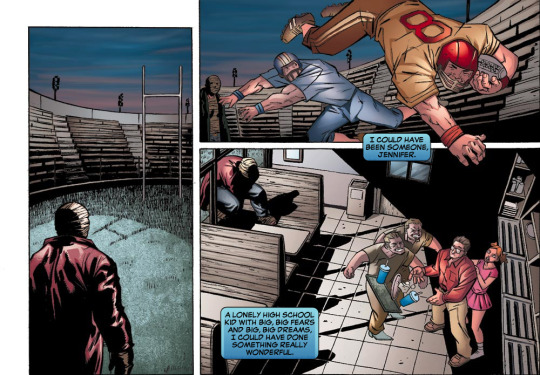
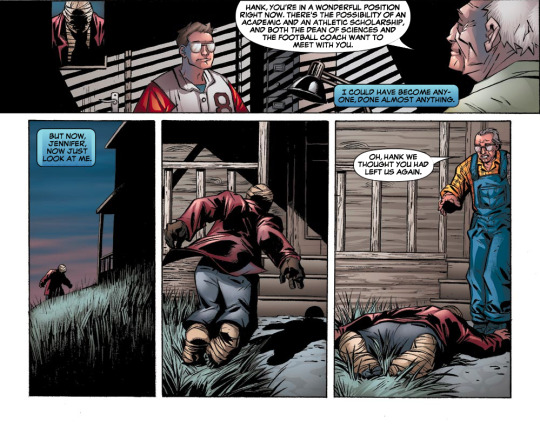
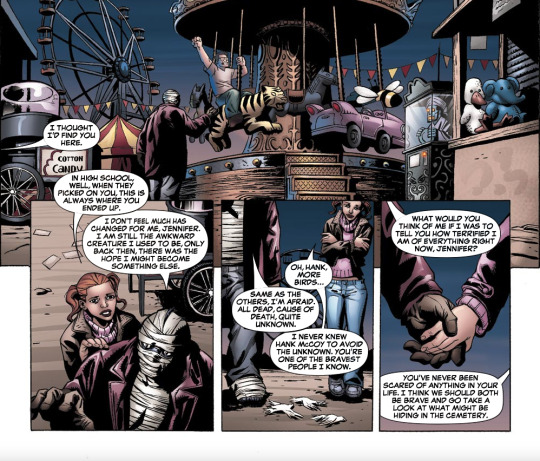
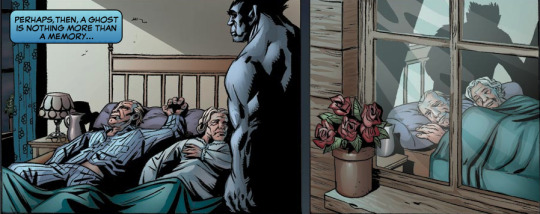
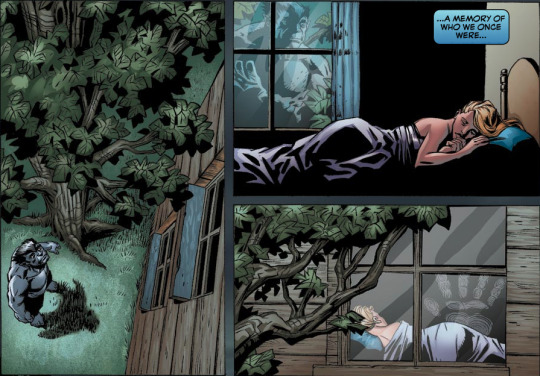
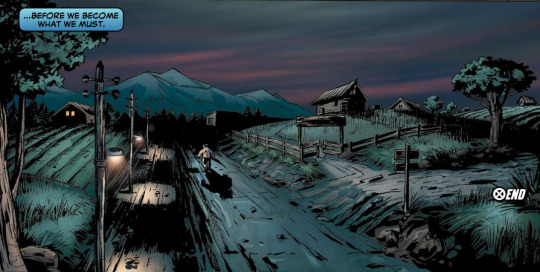
This story is so good because it understands that Hank made the single biggest fuck-up of his life in that lab, and he cannot undo that mistake, and he knows that. He has no right to. His ego died in that lab. Yeah, he can get a bit conceited, yeah, he can boast of what he's done, but he learned his lesson and he should never really reach the heights of ego and arrogance that he did back then.
All he has to do to remember what that led to is to look in the mirror.
It's not dissimilar to what happens with Mr. Fantastic - any time someone writes him as this big, boastful, arrogant scientist, they are forgetting that all he has to do to remember what that led to is look at his best friend, Ben Grimm, and what that led to last time. Actions have consequences. Hank and Reed know this all too well. They know this lesson, learning it again is bad storytelling.
Second of all - Hank is about change. His character is constantly changing, not just physically and visually, but emotionally and in terms of personality, too. He explicitly talks about this in Defenders.
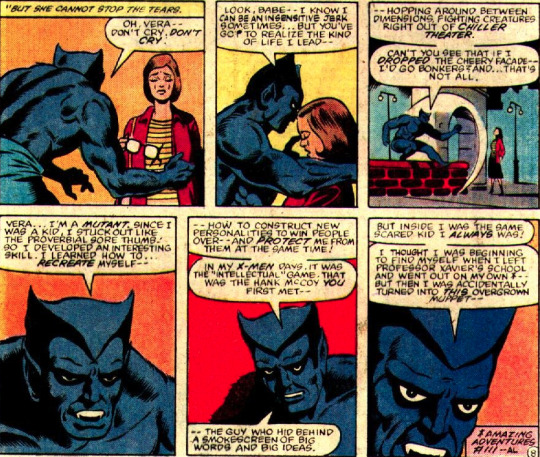
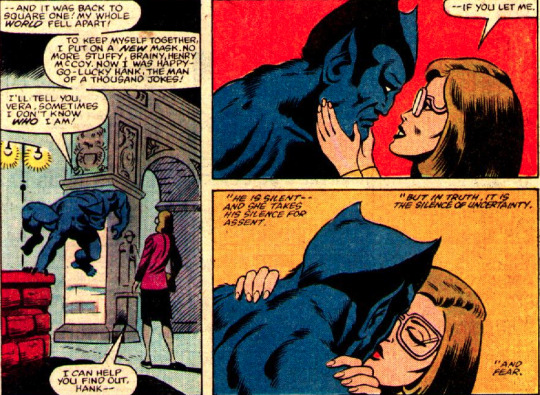
He's allowed to be different and change, he is, in some ways, a social mirror. He code switches. He's different with the X-Men and the Avengers and the Defenders and X-Factor and the Illuminati and S.W.O.R.D because those places are different, with different people and different aims and different needs, and so Hank becomes different.
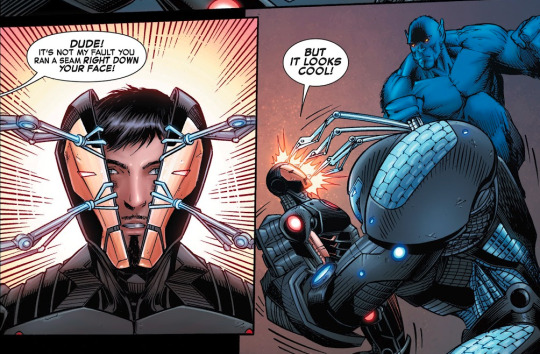
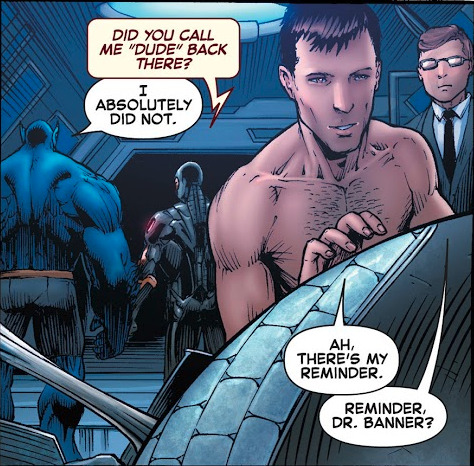
This is why feline Beast is so fucking important to his character growth, and why it was the best place for his character to go. By the late 90s, his character had, in ways, become a little bit stale, stuck in the rut of the jokey scientist with a philosophical side, and he needed a new internal conflict, because he's matured and dealt with most of his issues about growing up and taking responsibility.
Flipping the essential point of Beast's character, and making it so that it wasn't just other people who had to get over how Hank looked to see the brilliant, wonderful man beneath, but Hank himself, was genius.
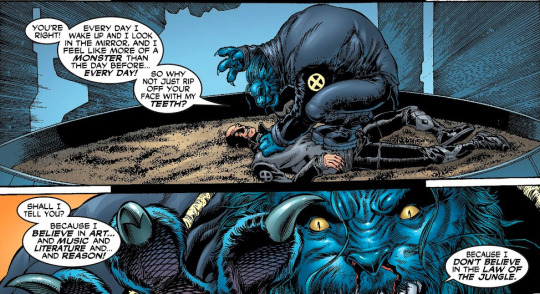
Third of all - Hank is a consummate performer. He sings, he dances, he quotes poetry, he can turn the Periodic Table into a dirty rhyme, he knows more than you do - he is constantly performing. The aggressive performance of both humanity and masculinity is essential to Hank's character, something I've talked about extensively here, and X-Force is so instructive here because Ben Percy comes so close to understanding this character point, but fails to do anything with it.
He's just so damned uncritical. He doesn't have anyone actually engage with Hank's performance, which is why X-Force is just a succession of increasingly dry monologues by an actor trying to do improv while surrounded by the rest of his amateur dramatics group who just aren't with it today.
Fourth - Hank McCoy is a good man. He isn't perfect, by any stretch, but the instant you try and make him an intrinsically bad person, you've failed to understand who he is, where he comes from, and what the entire point of his character is.
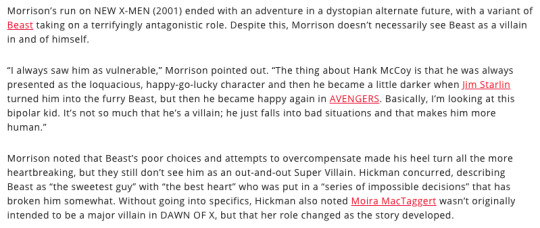

HE HAS NO DARK SECRETS.
HE HAS NOTHING TO HIDE.
I'm sorry, but Grant Morrison just understands Beast better than 90% of writers, because they understand that Hank is a complicated man, he is a walking thesaurus, he's a pile of insecurities and neuroses and mental illnesses, but he is so painfully genuine and sincere and honest. He doesn't believe in just straight up lying, because it is beneath him. He is eloquent and cultured and smart, and he believes in giving you the truth as you need to hear it.
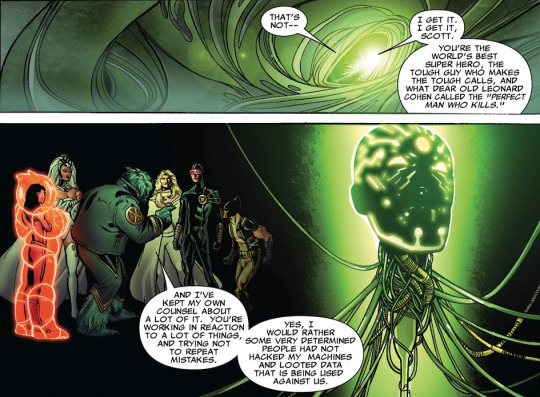
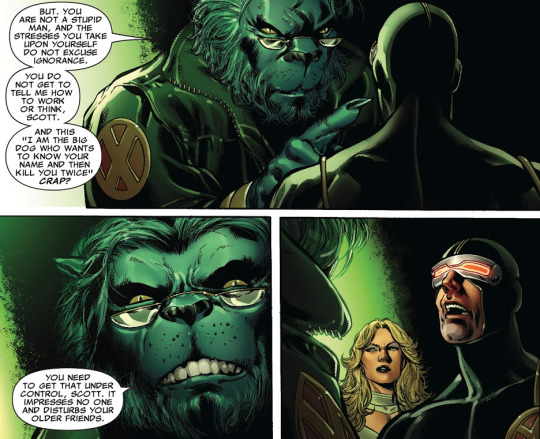
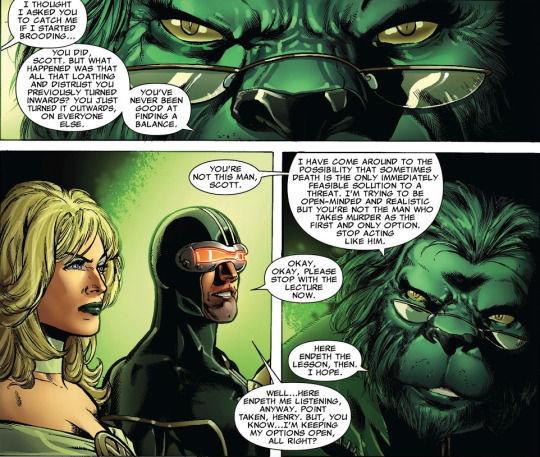
Bendis and Percy just don't understand what Hank is. Who Hank is. He's not the man who takes murder as the first and only option. Stop making him act like him.
As for what to bring to his character? Give him a child.
It is so painfully obvious that this man wants children.
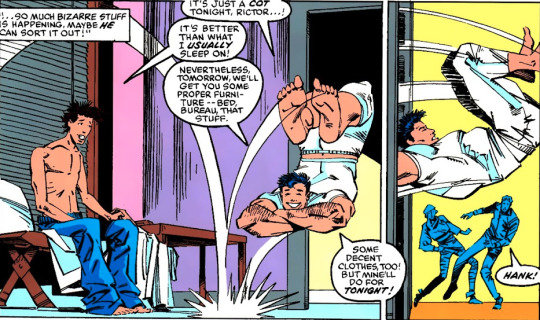
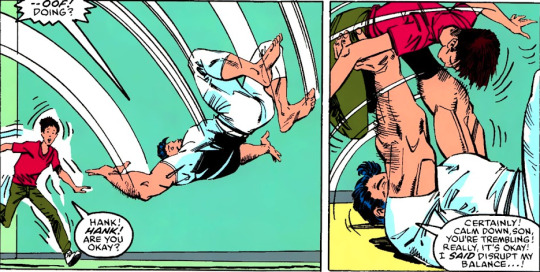
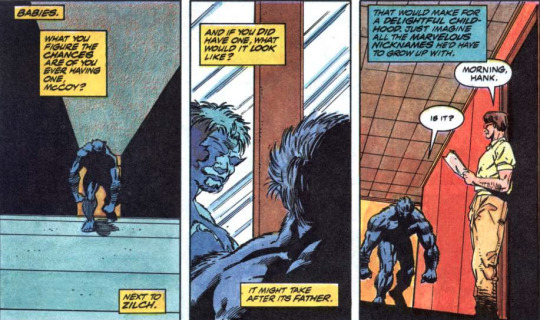

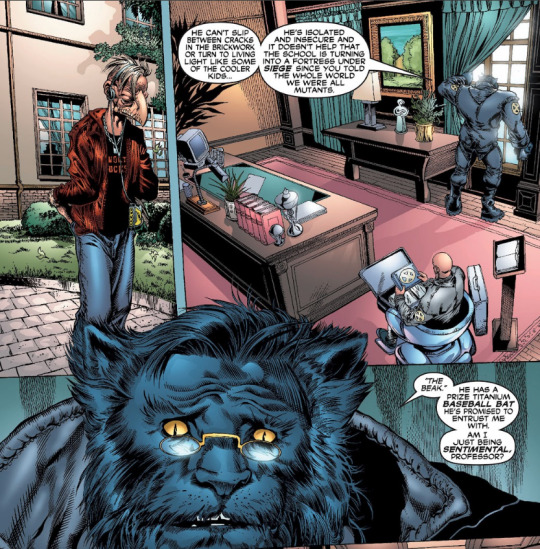
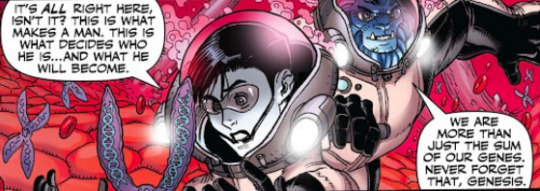
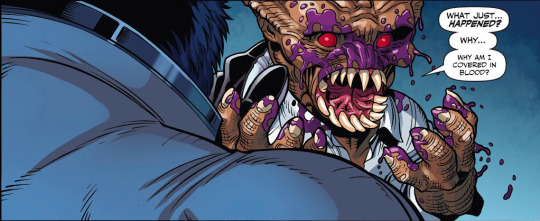

Challenging him by making him have either biological children, or getting to just straight up adopt a child, would be an excellent place to take his character. Now, granted, I understand that comic books fucking HATE children . . . but I don't care, you asked what would be a good place for his character to go, and this is it. The man deserves the chance to be a father. He'd be a good one.
27 notes
·
View notes
Note
What are the personalities of each of the fallen humans and can you tell me some facts about each of them?
Without major spoilers
Morgan has immense patience but has a bit of anger issues. It’s supposed to an ironic thing where someone with such an affinity with patience has the anger issues of the group. Most of the soul traits are determined by what they view as that soul trait. So Morgan defines patience as sticking it out even if it annoys her. Kinda similar to how bravery doesn’t mean without fear, but to push through the fear to be brave. Also her and Percy constantly fight as they’re the one who gets on her nerves the most, but if anyone else hurts or insult them, then they defend like a wild bulldog. As for a fun fact, Morgan is very interested in medicine thanks to a monster in her game, if she had the chance to grow up, she’d want to be a doctor. This is a reference to the bandaid in the omega flowey fight.
Nick is a himbo, but not in the traditional sense. He is the only character amongst them who wasn’t raised from a Germanic, English, or anything else like that. From his design, he is supposed to be from one of the indigenous tribes in North America. We didn’t want to be specific as we don’t want to offend anyone, so we made our own tribe based on the Cree tribe. That’s where most of his clothing references are from and even his gender, as he is two spirit, specifically the Cree Tribe’s “ᐄᓇᐦᐲᑲᓱᐦᐟ, înahpîkasoht: "A woman dressed/living/accepted as a man" or "someone who fights everyone to prove they are the toughest"”. As we searched more on Native American tribes we learned more on how they don’t view gender and sexuality the same way we do. So essentially, he has more of a culture shock rather than being outright dumb, which we thought would be very interesting. We looked at a lot of references on here and other places for how to make Native American characters to make Nick as respectful as we can. In his character sheet, it was clarified his real name isn’t actually Nick, rather a nickname as his friends when he went into the underground couldn’t say his name, thus a “Nick”name was born. Fun fact: Percy is the only one in the group who can actually say Nick’s real name, which solidified for Nick that this is now his sibling and his favorite person.
Stella is the stressed out mom friend of the group, trying her best to keep everyone alive and to not make the same mistakes she did. She tends to be very secretive as an incident in her life caused her to not trust telling anyone anything. Her story is compatible with undertale yellows hints on the integrity souls story, but revealing more would be big spoilers so I will not describe much now. The one thing I will say is a fun fact about her game that we had in mind, at the start of the game you do not have access to spare or act at all, so the pacifist run is still the true ending as you have to use those as they unlock over time to achieve it.
Percy is the resident smarta** of the group, correcting the other kids when they get something wrong with slight jabs. If you know Danganronpa think byakuya but more likeable and less of an a**hole. They’re the smartest of the group but still can be silly at times. They’re a bit self conscious as they weren’t very well liked in their village, which is why when Nick proclaimed their his sibling and favorite person now, it gave a rare moment of softness for Percy. Their fun fact is that theirs and Rosemary’s games are linked, but not in a buddy system. Essentially, Rosemarys half of the game is the present whilst Percy’s the past and it has different sections that show both half of the stories. If you’ve watched once upon a time, the structure is similar to that, where there’s a problem presented in the present and the past that mirror one another, till at the end they meet together in the story.
Rosemary is an extremely kind girl but can be very chaotic. Shes the one of the three characters of color in the group being Mexican and is the only one who actually has a confirmed mainstream religion, Quaker. Shes a savant in cooking many different dishes, one of her mechanics in her game is that she makes her own healing items with food items you find around the underground. Shes the only kid out of all of them who doesn’t really have depression, but is very traumatized as her death was the most brutal out of all the kids. Fun fact, she’s the only one who doesn’t eat something religiously like the other kids. Chara is chocolate, Frisk is snow, Morgan is snails, Nick is dirt, Stella is roses, Percy is pencils, and clover is gunpowder. She has an aneurysm everytime they eat those things, as it’s food sacrilege in her eyes.
Clover’s the other parent friend of the group, being the fun, goofy parent that balances out Stella. They have this need to help others even if it means detrimental to themselves. Most of us probably knows what happens in undertale yellow anyways, so I will talk about our own addition which is their relationship with their little sister. Clover is about 5 years older then Annabelle and was born just before America hit the Great Depression. Clovers parents were alright before but thanks to the stress of not being able to afford two kids and their apartment, they soured overtime. This made clover essentially become Annie’s parent, which is why they’re so parental with the others while still being quite goofy, they’ve done it before. Part of the reason why they went after the kids was to get the reward money that would make them have enough to leave the apartment and start new. They first wanted to get back to Annie as soon as the mission was done, but when they realized what it’d take to get home, they became conflicted. They promised to come home and they never wanted to leave Annie in that house alone, but they knew Annie wouldn’t want them to do such a horrific thing in order to get back to her, and honestly they didn’t want to either. So as our add on in the clover death scene, we also had the others promise to find their little sister when they get to the surface and get her out of there, not knowing that the underground and the surface have two different flows of time. Fun fact, clover is supposed to be written in a way that you can see them either being a girl, boy, or non-binary. There’s supposed to be an explanation for why it could be either one of the genders that fits perfectly. If she was a girl, then they dressed themselves like a boy during those times in order to have more freedoms in the age they lived in. Whether that’d be it to find work or other things like protection. If he was a boy, then when they wear dresses they genuinely just do not care and wear whatever’s comfortable. We have a headcannon that they would absolutely wear the grom dress that luz wore in owl house. Clover’s official gender identity is gender apathetic, but they’re willing to also be called nonbinary as it is similar. Also all the characters have different assignments on what they refer to clover, some call them she, some call them he, and some call them they. We have a list ready for reference so keep that in mind when reading the comic as it may be confusing to keep track of the different pronouns.
Frisks and charas personalities is mostly going to be ambiguous as there’s big plans relating to their personalities that we do not want to reveal yet. As for fun facts, chara is the only one that was summoned by their corpse whilst everyone else was summoned by their objects.
Asriel/flowey is a part of the soul kids dynamic, and is supposed to be written very ambiguously just like chara and frisk. There’s plans of a mystery surrounding these three that the other six soul kids are trying to solve. Fun fact, Morgan is the only kid that knows that flowey is asriel right off the bat, as in her game flowey is a companion of Morgan like underfell. Flowey wasn’t as evil during her time and was trying to keep to being asriel, but was changed after Morgan’s death.
I hope this was sufficient enough to answer your question. Thank you for being the first asker!
#bravery#clover undertale yellow#determination#justice#integrity#kindness#perserverance#soul kids#patience#undertale au#frisk dreemurr#frisk the human#frisk undertale#frisk#frisk au#undertale fan character#original character#character art#chara undertale#chara dreemurr#chara design
12 notes
·
View notes
Note
You said few months ago to aks your thoughts: what exactly do you mean by "Ozpin has long since given up on his task"?
I agree but don't have any coherent thoughts, except I also kind of think Oscar might've returned a spark to him ("You saved us," Ozpin also fighting the merge in the V9 Epilogue storyboard.)
Honestly this is a bit hard to explain bc I haven't touched RWBY in months (I'm neck deep in a batfamily hyperfixation), so my thoughts on this are VERY scattered, but I'll do my best to explain. I might come back and add any additional thoughts I might have.
Essentially, Ozpin doesn't really act like he's actively working towards his God-given task. Even if he is, I think he's doing the absolute bare minimum required of it. He's clearly tried before- if The Infinite Man is a 100% true story- but he labels that attempt as a mistake several times over. On top of that, he hasn't done... anything with the Relics after The Great War. The world was described as being in a time of 'unprecedented peace'- but Ozpin didn't DO anything with that.
I also think it's safe to assume that doing Lights task probably requires- essentially a cult dedicated to him. This is seen in The Infinite Man, since the woman Oz talks to mentions a 'final judgement', and the antagonist towards the end says that Oz's mere existence makes him a target. So it's safe to assume that pretty much everyone knew about his task at this time, and people didn't like the idea of it. I'm pretty sure it's also stated that this is the closest he's gotten to completing it. But as Ozpin recounts this, he repeatedly says that this was a mistake, and clearly regrets his actions here. He had good intentions, but it didn't matter in the end; the Circle was a mistake and he's asking for forgiveness.
On top of that, he says "Some people worship God's, while others insist we must be our own salvation. But the world doesn't work in absolutes, so why can't it be both?" This coupled with The Gift of the Moon and The Man Who Stared at the Sun as well as The Two Brothers heavily imply Oz believes that Light, or both of the Gods but especially Light, is selfish, petty, and that appeasing him not only requires heavy sacrifice, but hurts everyone else, and that humanity can replace the Gods; they don't need them.
The Academies themselves imply this too- they're safe Havens, Beacons of hope, keeping the world raised to shield them from destruction and providing Shade from the unforgiving sun (Light). They're symbolic, representing Oz's core values/beliefs, and one of those is that humanity needs to be shielded from Light. He very much also supports individuality, if the Great War is anything to go by plus the creation of the Academies. Something that, honestly, I don't think Light very much appreciates.
Also, Oz's inner circle doesn't really seem like Light followers to me. They follow Oz, and they believed his story of "The Gods cursed me for failing to stop Salem"- something that doesn't exactly paint them in a good light. The Gods don't seem to matter at all to them, just that they... exist. They also weren't aware of Oz's task, just that Oz wanted to keep things peaceful; not necessarily united, but peaceful. I also wouldn't call Oz's circle a cult either, since imo they really don't fit the bill to me, and it wouldn't make sense if they fit the cult BITE model since it'd hinder more than help, though the group IS dysfunctional.
Also, Oz knows how impossible the task is, knows it's just not possible to appease Light.
I do think he USED to work towards the task, but likely hasn't in a long time. I believe he's trying to keep Salem from the Relics because he believes that a second rebellion would never go well, and Remnant is free enough as is, even if he's essentially still chained via his immortality. Salem sees the Relics as a sort of Sword of Damocles- a constant threat looming over the world. And they are- but I think Ozpin also sees them as tools that could help the world.
Basically I think Oz has come to the conclusion that the world is free enough as is, and that rebelling against the Gods again will end very badly (as it had for Salem), while Salem believes that the world is still in chains. Oz's fears definitely aren't unfounded- after all, the Gods pretty much played with him like a toy by repeatedly reviving and then killing him.
Oz has pretty much completely lost faith in the Gods, if he had much to begin with, and the only reason I believe he followed his task initially was likely due to fear and believing Salem hates him, rather than out of any real devotion.
Oh and, I almost forgot- the tale of the two brothers is widely regarded as a fairytale on Remnant, and the main characters had to be TOLD about them, so it's safe to assume they're not nearly as widely known anymore, and we haven't seen any evidence of anything religious surrounding them yet. So there likely isn't any widespread religion about the Brothers, and if there is a religion, it certainly isn't large. There's definitely no mention of any in-universe backlash of including a supposedly widespread religion in a book of fairytales (and I say this because I've seen people say that it's a widespread religion like Christianity, when there's nothing implying that it currently is. During the time of The Infinite Man? Yeah, but not in the modern day).
Soo, there's my analysis on Oz and if he's still working towards his task and what his thoughts on the Gods are.
#felix (host)#rwby#ozpin#rwby rambles#rwby analysis#rwby meta#professor ozpin#ruby rose#rwby gods#god of light#god of darkness#rwby salem#honestly i could go on about how Shade is an insane outlier in terms of academy names#and how its basically a v v subtle fuck you to Light
19 notes
·
View notes
Text
So, Schmendrick tries to act threatening and brags (a LOT) in TLU and in other short stories about him. Sure, it is often played for laughs, and Schmendrick is essentially pulling a 'red panda-trying-to-look-menacing' stunt.

Soooo dangerous and fierce...
He knows he cannot count on magic working properly in dangerous situations and even though he is impulsive enough to jump into a fight with much stronger people on desperate occasions, he cannot expect to end up victorious.

Schmendrick you weigh 30 kg soaking wet, what did you think would have happened?
But thinking again, I believe Schmendrick is not doing this only because he is afraid of being unable to defend himself. That is one possible outcome, mind you — a spell not working at all or backfiring and damaging him, for example. However, it is hinted that Schmendrick is very aware that he can be extremely dangerous with his uncontrolled magic, even deadly.
Think about it. In The Last Unicorn he is endangering the unicorn while attempting to free her by magic, with the summoning of the demon and the cage shrinking. His short stories are riddled with examples of his mistakes being hazardous to those around him, being it accidentally summoning a 8-day long uninterrupted snow storm or almost running over Nikos with an entire horse while attempting to float a horseshoe. In Schmendrick Alone he ends up killing a man. He had 0 intention to do so, just wanted to scare the man off, but ended up unable to control the demon he summoned.
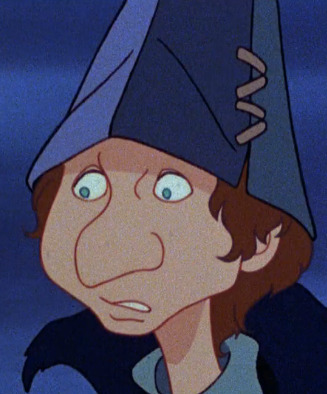
The moment you realize you have blood on your hands while you were just trying to gallantly protect a girl from an unwanted suitor
In the end, Schmendrick makes a big talk about his skills because, yes, he is aware his prowess is anything but, but also (and more meaningfully) because he knows he can be a danger for those around him, he knows he is capable of accidentally offing someone if his magic runs too wild.
Even when people mean him harm, he still wants to avoid dire, unwanted consequences (he cries about Mommy Fortuna being gutted by the harpy, and he definitively did not like the lady, ffs!). Just think about what might happen when someone with such uncontrollable power gets cornered... Schmendrick, in my opinion, tries to avoid to end up in such situations, so he brags and boasts and hopes that that's enough to keep any potential foe at distance, for everyone involved's safety.

It's like watching those butterflies with owl's eyes on their wings...
#the last unicorn#schmendrick#tlu#schmendrick rolling deception trying not to kill anyone#he is a boaster but a gentle soul to his core#he knows he can go to 0 to a 100 in less than a bat of an eye#from harmless to jesus christ we are all gonna die#poor boi
5 notes
·
View notes